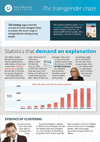
Social contagion
We’ve all become familiar with viral contagion. This briefing explains the concept of social contagion.

A woman who took cross-sex hormones in an attempt to live as a man has spoken about how the internet can influence teenagers to believe they are the opposite sex.
Speaking on The Michael Knowles Show, 22-year-old Helena Kerschner shared how at 15 years-old, body image issues and a lack of friends led her to spend more time online. She found the website Tumblr, where “gender ideology is very prominent”, and “social incentives” push users to change their pronouns.
Kerschner gradually came to believe that she was a boy and started taking hormones at 18-years-old, but has now stopped doing so and has re-embraced her birth sex.
She said that internet communities can make “you feel accepted and they’re where you want to fit in, so you’re willing to do almost anything to kind of conform to that social group”.
Kerschner explained: “There are people in these communities who will say, if you don’t like your body, that’s a sign of gender dysphoria, if you don’t fit in with other girls, that’s a sign of gender dysphoria, if you don’t like the way your voice sounds in a recording, that’s a sign of gender dysphoria.”big complicated stew of unreality
She added: “So it’s really this stew, this big complicated stew of unreality that young people fall into when they’re just scrolling all day on social media and don’t have pushback really”.

We’ve all become familiar with viral contagion. This briefing explains the concept of social contagion.
Dr Erica Anderson, a male clinical psychologist who lives as a woman, has voiced his concern over the rising number of gender-confused children in the United States.
He said: “To flatly say there couldn’t be any social influence in formation of gender identity flies in the face of reality.”
Dr Anderson added: “Giving over to hormones on demand will result in many more cases of poor outcomes and many more disappointed kids and parents who somehow came to believe that giving kids hormones would cure their other psychological problems.”

This briefing argues that the concept of social contagion helps to explain the recent surge in transgenderism among young people.
Earlier this year, draft clinical guidance recommended that gender-confused young people should always undergo a comprehensive mental health assessment rather than simply be prescribed experimental trans-affirming ‘treatments’.
The World Professional Association for Transgender Health advised psychological assessments for young people, who must have experienced gender confusion for “several years”, before issuing hormones. It also recommended informing them of the resulting risks such as the “potential loss of fertility”.
However, it removed its previous requirement for adults to undergo such assessments before accessing hormones.
![]()
Detransitioner: ‘The NHS should expect legal action’
‘After gruesome trans surgery, I’ve returned to my birth sex’